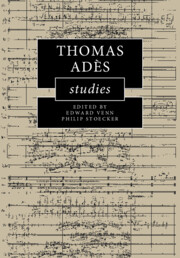Book contents
- Thomas Adès Studies
- Thomas Adès Studies
- Copyright page
- Dedication
- Contents
- Figures
- Tables
- Music Examples
- Online Materials
- Contributors
- Preface
- Acknowledgements
- Notes on the Text
- 1 ‘Chronically volatile’
- 2 Performing Adès
- 3 ‘Fountain of Youth’, ‘River of Meaning’
- 4 ‘Oh brave new Caliban’
- 5 Chaconnes in the Music of Adès
- 6 Closing the Circle?
- 7 A World in Constant Motion
- 8 Musique automatique? Adèsian Automata and the Logic of Disjuncture
- 9 Narrating the Dance of Death
- 10 Hearing Voices in Adès’s Operas
- 11 The RICH Logic of Adès’s The Exterminating Angel and The Tempest
- 12 Sonic Allegory in Adès’s The Exterminating Angel
- Bibliography
- Index
8 - Musique automatique? Adèsian Automata and the Logic of Disjuncture
Published online by Cambridge University Press: 18 November 2021
- Thomas Adès Studies
- Thomas Adès Studies
- Copyright page
- Dedication
- Contents
- Figures
- Tables
- Music Examples
- Online Materials
- Contributors
- Preface
- Acknowledgements
- Notes on the Text
- 1 ‘Chronically volatile’
- 2 Performing Adès
- 3 ‘Fountain of Youth’, ‘River of Meaning’
- 4 ‘Oh brave new Caliban’
- 5 Chaconnes in the Music of Adès
- 6 Closing the Circle?
- 7 A World in Constant Motion
- 8 Musique automatique? Adèsian Automata and the Logic of Disjuncture
- 9 Narrating the Dance of Death
- 10 Hearing Voices in Adès’s Operas
- 11 The RICH Logic of Adès’s The Exterminating Angel and The Tempest
- 12 Sonic Allegory in Adès’s The Exterminating Angel
- Bibliography
- Index
Summary
In this chapter I offer a reorientation of Thomas Adès’s relationship to surrealism by positioning his music in the context of automatism, wherein surrealism's famed incongruities become legitimate, logical manifestations of our unconscious. This perspective allows us to incorporate works that have not often been understood as surreal, like the Mazurkas studied here. Second, automatisms link Adèsian surrealism to the compositional logic that theorists have uncovered in the past twenty years. And finally, Adès’s automatism suggests a way of composing genuinely surreal music. André Breton, surrealism's founder, thought music was ‘confusing’, and much literature on Adès’s music has established such a connection only by suggesting the music's surreal qualities are found in its painterly traits. I, on the other hand, suggest that through automatism we are able to imagine those marvellous sounds that emerge from logical processes of structured time as themselves fundamentally surreal.
- Type
- Chapter
- Information
- Thomas Adès Studies , pp. 163 - 187Publisher: Cambridge University PressPrint publication year: 2021
- 1
- Cited by

